L <<< Author: M >>> N
Jump to:
Irina Mashinski |
Tara L. Masih |
Doug Mathewson |
W. R. Mayo |
Michael McInnis |
Ed Mcmanis |
Corey Mesler |
Gary Metras |
David P. Miller |
Ed Miller |
Gloria Mindock |
Nancy Mitchell |
Barbara Molloy |
Edward Morin |
Susanne Morning |
E.K. Mortenson |
Alexander Motyl |
Barbara E. Murphy
Irina Mashinski
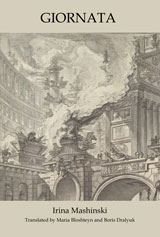 GIORNATA by Irina Mashinski
GIORNATA by Irina Mashinski
Translated by Maria Bloshteyn and Boris Dralyuk
Červená Barva Press, 2022-
Irina Mashinski was born and raised in Moscow. She graduated from Moscow University, where she studied theory of landscape and completed her PhD in paleoclimatology. In 1991, she emigrated to the United States, where she taught high school mathematics as well as literature, history, and meteorology at several universities. Mashinski is the author The Naked World (MadHat Press, 2022) and of eleven books of poetry and essays in Russian. She is co-editor, with Robert Chandler and Boris Dralyuk, of The Penguin Book of Russian Poetry (Penguin Classics, 2015) and of Cardinal Points, the journal of Brown University's Slavic Department. Her work has been translated into several languages and has appeared in numerous journals and anthologies both in the US and internationally. Website: www.irinamashinski.com
Irina Mashinski is a poet who has the rooting feeling for the tag game played between the inapposite and the apposite. Accordingly, nothing is off-limit because there is no limit for a poet who can be microscopic and cosmic, offhand and adjuring, and who, above all, is willing to descend and ascend-again, without limits. The long central poem In Absentia is a tour de force of relentless probing of loss and the innumerable, parti-colored shards that accompany loss, the drear yet enticing yet shattering yet sustaining landscape of memories. The translations bring a wonderfully attentive ear to the page, one that delights in the resonances and the cadences of English. All in all, this book is a book of poems to live with, containing the vastness and fearlessness we all hope to find in poetry.
-Baron Wormser, author of Legends of the Slow ExplosionIf poetry is the language capable of shedding light on the things beyond, the things in between, then Irina Mashinski illuminates them - to the very core of our existence.
-Lothar Quinkenstein, author of Souterrain and translator of Olga TokarczukIrina Mashinski's poems in Giornata inhabit the landscape of elegy and exile, as well as the actual landscape of rural America. She forgets nothing, asking without self-pity, "Who's left?" These translations feel wholly original, rich in music, but mostly rich with the poet's sensibility, the tenderness with which she opens to her losses and offers them to us, like her grandmother's "Moscow teacups" an image so simple and so arresting. Mashinski teaches us to reckon with the past, to know the world as inherently elegiac, and yet to also be tied to the moment, to love the moment, not missing anything, not the clouds blooming outside her window, or the detritus on the forest floor. These are poems to return to and live with.
-Anne Marie Macari, author of Heaven BeneathIrina Mashinski's poetic eye has such range, it seems to move above the earth and see both the changing of landscapes and the shift between eras with equal ease. There is also an underlying cheerful quality about the poems, which could be straight elegies for our terrible centuries and histories but somehow refuse to give in to undiluted sadness. These new translations convey the purity and fineness of Mashinski's work, whilst conveying its formal complexity - a rare feat.
-Alexandra Dugdale, author of Deformations and JoyGiornata. A day's work on a fresco, on a true fresco, buon, where the pigment is permanently fused with the plaster, where the vision, the dream, becomes one with its surface, where the day does not just point to its mystery, it is our mystery. In these poems, Irina Mashinski migrates between Russia and the U.S., between her past and present, between memory and memory. In so doing, she teaches me what cannot ever be left or lost: this moment, our now. Mashinski is a poet's poet. I am in awe. -Rebecca Gayle Howell, author of American Purgatory and Render / An Apocalypse
$18.00 | ISBN: 978-1-950063-60-4 | 94 Pages
Tara L. Masih
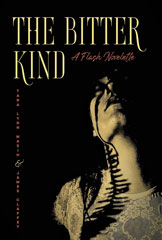 The Bitter Kind A Flash Novelette by Tara Lynn Masih & James Claffey
The Bitter Kind A Flash Novelette by Tara Lynn Masih & James Claffey
Červená Barva Press, 2020-
In this spare novelette, acclaimed flash fiction writers James Claffey and Tara Lynn Masih collaboratively create an original tale of loss and love, as The Bitter Kind deftly alternates between Stela, the daughter of a ship's captain, burdened by her family secrets, and Brandy, a Chippewa orphan, haunted by ghost wolves and spirits. The authors cross genres and borders between historical and contemporary, speculative and realistic, presenting two unforgettable characters on a journey toward their inevitable, fateful destination.
"With two writers as well matched artistically as Tara Lynn Masih and James Claffey, a collaboration is cause to celebrate. This richly woven, haunting novelette transcends the confines of its brevity; feels tender, sprawling, immersive. The Bitter Kind is an alchemy, a duet, a gorgeous melding of two of our most treasured literary voices."
-Kathy Fish, author of Wild Life: Collected Works from 2003-2018"With short, alternating passages, James Claffey and Tara Masih vividly illuminate the separate and commingled lives of Stela and Brandy in this original and elegantly textured novella. It is a story, human and soulful, of place, mysticism, and the hard-won ground we all struggle toward."
-Robert Scotellaro, author of Nothing Is Ever One Thing"From ghost-soaked frontier towns to leafy waterways, frozen river basins, and the open road, Tara Masih’s and James Claffey’s parallel narratives tumble along through stunning landscapes of loneliness and beauty. The writing is evocative and tender, exploring both the haunted and the haunting; touching in its examination of broken things and masterful in its prose."
-Kimberly Lojewski, author of Worm Fiddling Nocturne in the Key of a Broken Heart"With beautiful imagery and a seamless voice, Masih and Claffey move us through decades as two parallel lives seek solace and healthy human connection. Stela, long plagued by abusive relationships, and Brandy, spurred by tragedy and unlucky in love, are shaped and steered by the things that haunt them, and, perhaps, the things that will someday guide them to heal. This winning collaborative effort is both stirring and satisfying."
-Mel Bosworth, author of FREIGHT and coauthor of Second Acts in American Lives"With their binocular lyric lenses, Masih and Claffey provide a lacquered and sanded depth to this compilation set in the chambered karst of our heartfelt heartland. The book is a layered lanyard, a laurel wreath, an ouroboros, Mobius’s Mobius, an effortless enso, and a terrific torqueing torus. The diastolic/systolic dub-Dub, a syncopated sink or swim, of the call and response had me reeling, a time step timed to hit the one and the three. What I am saying is that this is a tour de force, a fait accompli."
-Michael Martone, author of Brooding and The Moon Over WapakonetaReviews:
"To read The Bitter Kind is to witness two writers who, in this slim 68-page volume, manage a marvel by beautifully performing two seemingly impossible tasks... the first astonishing thing about The Bitter Kind: Masih and Claffey blend their styles so seamlessly that, aside from a very few turns of phrase, it's nearly impossible to tell the difference between their voices. The second astonishing aspect of this book is that Masih and Claffey create a rivetingly cohesive central narrative from flash segments... Even more extraordinarily, they form a novelette with the scope and sense of fulfillment one would expect of a much longer work."
$18.00 | ISBN: 978-1-950063-40-6 | 68 Pages
Emma Bolden, Tupelo Quarterly
To read full review click here...
Doug Mathewson
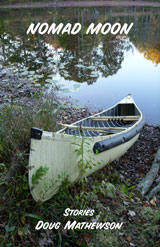 Nomad Moon Stories by Doug Mathewson
Nomad Moon Stories by Doug Mathewson
Edited by Sally Reno
Červená Barva Press, 2022-
Doug Mathewson writes short, and even shorter fiction. His work has appeared here and there, now and then due to the kindness and forgiving nature of numerous editors to whom he is most sincerely grateful. He is the editor of Blink-Ink www.blink-ink.org Also he sweeps up and does odd chores for The Mambo Academy of Kitty Wang. More of his work can be found at Little 2 Say www.little2say.org
Nomad Moon is a collection of twenty four short stories by Doug Mathewson. They have been described as "True stories from imaginary lives." Every one is true except for the pretend and made up parts. Some stories are sad, and some humorous, but all showing the authors love of life and human kind.
$13.00 | ISBN: 978-1-950063-56-7 | 27 Pages
W. R. Mayo
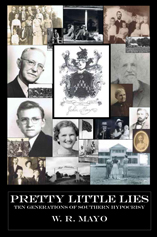 Pretty Little Lies
Pretty Little Lies
Ten Generations Of Southern Hypocrisy by W. R. Mayo
Červená Barva Press, 2009-
Pretty Little Lies, as told from the perspective of a member of the southern Mayo clan, reads like a gothic novel spanning centuries. In a take no prisoners accounting. W. R. Mayo's memoir is a serious undertaking that makes for fascinating reading. Though not from an old southern family, I, for one recognize much of what we all carry in our DNA.
- Susan Tepper, author of DEERIn his biting family memoir, Pretty Little Lies, W. R. Mayo courageously puts a dagger into the heart of the southern plantation myth. By unflinchingly facing his own dysfunctional past, Mayo gives the romantic, idealized version of ante- and post-bellum life below the Mason-Dixon Line a well-deserved paddling. In moving prose, he reveals the underbelly of the "big house"- a way of life created and sustained by traffic in human slavery and one reliant upon the manipulation, or far worse, of the land and those who lived and toiled upon it. Pretty Little Lies is a must read for anyone looking to see past the mythology of the Old South.
- J. B. Hogan, authorUnflinching. Revealing. In this exhaustively researched family history, Mayo charts the rise of a Southern family from its roots in England to the founding of a plantation in Southeastern Arkansas in the middle of the nineteenth century. Through the degradations of the Civil War, two world wars, and countless family conflicts still raging to this day, Mayo lays bare the mythology of Southern "Nobility." He frankly examines the treatment of slaves by his family which led to "the other Mayos," a family of blacks descended from these slaves, and describes the uncompromising natures of his progenitors. From his mother who never apologized for anything, considering it a waste of time to his racist, domineering father, Mayo chronicles the infighting, manipulation, and xenophobia prevalent in his family's past. Mayo digs to the core to face head-on not only the lies, exaggerations and conscious-salving stories of "pride" passed down within his family, but also to uncover the real story of Southern history. As Faulkner said, "The past is never dead. In fact, it's not even past." Mayo's past is certainly not dead, though this book is an attempt to put a stake through it's heart.
$15.95 | ISBN 978-0-9773695-4-0 | 211 Pages | No longer available
- C. L. Bledsoe, author of Anthem, Riceland and editor for Ghoti Magazine
Michael McInnis
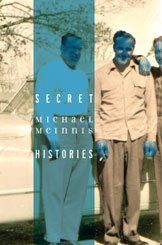 Secret Histories by Michael McInnis
Secret Histories by Michael McInnis
Červená Barva Press, 2019Michael McInnis lives in Boston and served in the Navy chasing white whales and Soviet submarines. His poetry and short fiction has appeared in Chiron Review, Cream City Review, Deadly Writers Patrol, Naugatuck Review, Oxford Magazine, Unlikely Stories and Yellow Chair Review to name a few. He was the founder of the Primal Plunge, Boston's only bookstore dedicated to 'zines, underground culture, and small press literature. His previous two books, Hitchhiking Beatitudes and Smokey of the Migraines were both published by Nixes Mate Books.
More Praise for Secret Histories
Secret Histories, by Michael McInnis, is a journey from sea to sky, where you "see the stars in each swell, as if land exists only at the pleasure of the ocean." Mermaids walk amongst us, and fortune may allow us to trace their tattoos with our tongues. There are secret messages in storms and unquenchable thirsts, and a girl named Lucy, whose skin we can't stop thinking about. McInnis shows us "how we dream up gods in our desert consciousness," knowing that all the while, the sharks feed below.
$17.00 | ISBN: 978-1-950063-10-9 | 122 Pages
-Heather Sullivan, author of Method Acting for the Afterlife
Ed McManis
-
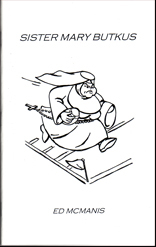 Sister Mary Butkus
Sister Mary Butkus
by Ed McManis
Červená Barva Press, 2007 -
Ed McManis is a teacher, writer, poet, editor, songwriter, husband and dad—not always in that order. His work has appeared in more than 40 publications.
Cover art by Joe McManis
$7.00 | 37 Pages | In Stock
Corey Mesler
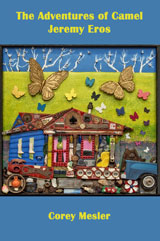 The Adventures of Camel Jeremy Eros by Corey Mesler
The Adventures of Camel Jeremy Eros by Corey Mesler
Červená Barva Press, 2020-
Corey Mesler has been published in numerous anthologies and journals including Poetry, Gargoyle, Five Points, Good Poems American Places, and New Stories from the South. He has published 9 novels, 4 short story collections, and 5 full-length poetry collections, and a dozen chapbooks. His novel, Memphis Movie, attracted kind words from Ann Beattie, Peter Coyote, and William Hjorstberg, among others. He's been nominated for the Pushcart many times, and 3 of his poems were chosen for Garrison Keillor's Writer’s Almanac. He also wrote the screenplay for We Go On, which won The Memphis Film Prize in 2017. With his wife he runs a 145 year-old bookstore in Memphis. He can be found at https://coreymesler.wordpress.com.
Camel Jeremy Eros, 60s Memphis poet, bon vivant and scenester, appeared in two earlier Corey Mesler novels. Now he gets his own biography. Beginning with his birth in Frayser, a gray carbuncle on the side of Memphis, Tennessee, and following him through his academic success and then his political/poetical awakening at the University of California, Berkeley, the novel touches on numerous multi-hued, phantasmagoric, hippiefied cultural landmarks, including the small press, bookstore scene in San Francisco, protests in the streets, and free love. Eventually Camel finds his way back to Memphis where he meets the darling of his life, the willowy sculptress, Allen. The novel’s latter half takes place mostly in Memphis as the lovers struggle with earning money, making art, setting up house, and eventual health issues that threaten to burst their rainbow bubble.
"The Adventures of Camel Jeremy Eros has an exuberant voice that pulls you in and a swaggering, larger-than-life character to keep you happily entertained. And then - just when you least expect it - this vivacious, colorful tale of a man's pursuit of literature and love also manages to break your heart."
-Tova Mirvis, author of The Ladies Auxiliary and The Book of Separation: A Memoir"Corey Mesler's new novel The Adventures of Camel Jeremy Eros is a wonderfully Gumpian Memphis and San Franciscan Roman à clef, infused with aching lyricism, sharp wit, and ramped-up-to-eleven literary cleverness, its crackling prose delivered with a soft West Tennessee twang. The story of a Memphis poet and teacher named Camel Eros, his sculptor wife Allen and their love affair both with each other and with life itself is told through a redolent halcyonic haze, evoking memory of a time in America-the middle decades of the last century-that were a swirling paradox of protest, rebellion, free love and unfettered spiritual and artistic expression. Mesler's characters offer warmth and depth to this poignant tale, which is funny, wickedly sexy, and terrifically engaging."
-Mark Dunn, author of Ella Minnow Pea and We Five"Rascally on the page, subversive in spirit and style, Corey Mesler just may be Memphis' answer to Ken Kesey. Here is a rip-snorting, picaresque tale of the Bluff City from the fifties and sixties that will make most Memphians smile-and will make non-Memphians wonder what the hell they've been missing."
$18.95 | ISBN: 978-1-950063-08-6 | 318 Pages
-Hampton Sides, bestselling author of Hellhound On His Trail
Gary Metras
 MARBLE DUST Poems by Gary Metras
MARBLE DUST Poems by Gary Metras
Červená Barva Press, 2024-
Gary Metras was appointed the inaugural Poet Laureate of the City of Easthampton in 2018. His essays, reviews, and chiefly poems have appeared in hundreds of journals since the 1970s, including America, American Angler, Boston Review of Books, The Common, Connecticut Poetry Review, Gray's Sporting Journal, Poetry, Poetry East, Salzburg Poetry Review, and Yankee Magazine. He has taught high school English and college writing. A master letterpress printer, he ran Adastra Press for forty years, publishing poets from all over the country.
From Izmir, Turkey to Stonehenge, England, these are poems of adventure, revelation, and enlightenment. The history, mythology, and ruins of ancient Greece and Rome are newly experienced and newly interpreted for the modern reader. The lives and achievements of Francis d'Assisi, Michelangelo, Leonardo, Beethoven, John Keats, and Oscar Wilde are given new meaning, while a belly dancer, a butcher, a taxi driver, and a waiter and a waitress are elevated beyond their typically mundane jobs and lives. Join the author as he walks the Bridge of Sighs in Venice, rides a cable car up an Austrian alp, contemplates the paintings in the Sistine Chapel, a Christmas in Paris, lunches in the café atop the Euromast in Rotterdam, and so much more.
Marble Dust is like a travelogue in four parts. It is a paean of geography, actual, spiritual, historical, mythological as well as a special place in our collective hearts. From Greece to Italy and the rarified air and memories of mountains in Austria, Switzerland and the mysteries of Stonehenge. Marble Dust merges all these into a seamless literary tapestry. It also encompasses themes pertaining to art, artists, poets and architecture. This collection places the enraptured reader in the center of this journey as time bends backwards and forward. All places blend into the external and internal worlds. Poem after poem is replete with breathtaking imagery and proven mastery of the written word. Reading Marble Dust is a memorable, exhilarating and a highly recommended experience.
—Harris Gardner, Poetry Editor, Ibbetson Street, author of No Time for DeathCover photo: "Ionic column capital, 5th-4th century BCE, the Acropolis, Athens. Photo by the author."
$19.95 | ISBN: 978-1-950063-95-6 | 102 Pages
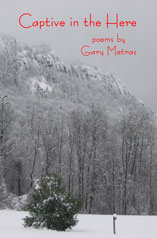 Captive in the Here poems by Gary Metras
Captive in the Here poems by Gary Metras
Červená Barva Press, 2019-
Gary Metras is the author of four previous poetry books along with eleven chapbooks, most recently, Two Bloods: Fly Fishing Poems. His poems, essays, and reviews have appeared in such journals as America, American Angler, The Boston Review of Books, Gray's Sporting Journal, Poetry, Poetry East, Poetry Salzburg Review, along with the recent anthologies Working Words: Punching the Clock and Kicking Out the Jams (Coffee House) and The American Public School Teacher: Past, Present, & Future (Harvard Education Press). He is a past recipient of the Massachusetts Fellowship in Poetry. He is the editor, publisher, and letterpress printer of Adastra Press. He fly fishes the streams and rivers of western Massachusetts as often as possible.
Critical praise for the books and chapbooks of Gary Metras:
"The Moon in the Pool is the work of a seasoned poet, a writer accustomed to having his way with words. But there is more to these poems; they make us what we already are. In other words, they tap into our shared humanity….This small book is a welcomed read. Its aftertaste is long lasting-analogous to the love it expounds, in the midst of all else that life offers."
-The Compulsive ReaderGreatest Hits 1980-2006: "The words are gifts from an accomplished poet, sure of his words and his mission to deliver his words carefully measured and assured… So read this book and see a good writer at work."
-HotmetalpressUntil There Is Nothing Left: "Metras is an unpretentious writer who keeps company with readers...In fact, he's good company. His voice is direct, simple, uncomplaining and democratic."
-Daily Hampshire GazetteSeagull Beach: "The book's feel, heft, and contents are an evocative experience."
-Virginia Quarterly ReviewA Room Full of Walls: "…powerful and successful, so eloquent of strong, controlled emotions….the very considerable achievement your collection represents."
$17.00 | ISBN: 978-0-9981027-3-3 | 66 Pages
-Anthony Hecht
David P. Miller
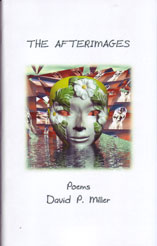 THE AFTERIMAGES Poems by David P. Miller
THE AFTERIMAGES Poems by David P. Miller
Červená Barva Press, 2014-
David P. Miller's poems have appeared in print in Meat for Tea, Stone Soup Presents Fresh Broth, Ibbetson Street, the 2014 Bagel Bards Anthology, and Durable Goods, and online in the Muddy River Poetry Review, Wilderness House Literary Review, Oddball Magazine, and the Boston and Beyond Poetry Blog. He has twice been a featured reader at Stone Soup in Cambridge, Mass., where he is a semi-regular on the open mike. His three "micro-chapbooks" - Caution: Many People Walking, Probably Not Haiku, and Reversible Folded Poem, are available online thanks to the Origami Poems Project. David was a member of the multidisciplinary Mobius Artists Group of Boston for 25 years, visits with the Bagel Bards in Somerville, Mass., and is a member of Tom Daley's Tuesday night poetry workshop at the Boston Center for Adult Education. He is a librarian at Curry College, in Milton, Mass.
Cover Art: Jane Wiley
SEE YOUR HEARING
Listener, burnish the sense
where it is felt, each jewel, sound-being.
Air's voices shift as skull pivots,
left side and right, six directions
set in unwavering mind.My scatterhead's listening checklists
church chimes' humid auroras,
mosaic clatter of startled bird babies,
flat thump of cardboard on plastic.
Heard that. Heard this. The roster ticked.Packed earbuds guard concentration's thin gate.
Play it again: repeat, fade, decay.
Repetition manufactures foreplay for the ears,
but with bare attention stillness' pulse shines.Now you, see your hearing. Introspect
$7.00 | 43 Pages | In Stock
sound in your skull's heaven: lustrous percepts.
Each beat, rasp, slide, crack, sigh,
manifest like honey, like water, like night.
Ed Miller
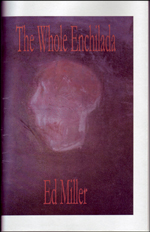 The Whole Enchilada by Ed Miller
The Whole Enchilada by Ed Miller
Červená Barva Press-2006-
Think of The Whole Enchilada as an absurdist playground, and you're invited. There you'll find an abundance of whooping, hollering, cussing and adolescent ridicule. There you'll find a lot of sand being flung around, kicked around. It's a ruckus of mockeries, a splenetic free-for-all.
The poems: more than a few are found-text pieces, derived from the ephemera and detritus of life, which are combined or manipulated or both; some are casual narratives; some began as correspondence and later stood trembling on their own.
$6.00 | 48 Pages | In Stock: 30
Gloria Mindock
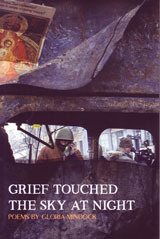 Grief Touched the Sky at Nightby Gloria Mindock
Grief Touched the Sky at Nightby Gloria Mindock
Glass Lyre Press, 2023Gloria Mindock is editor of Červená Barva Press. She is an award-winning author of six poetry collections and three chapbooks. Her poems have been published and translated into eleven languages. Her recent book, Ash, was translated into Serbian by Milutin Durickovic and published by Alma Press in Belgrade in 2022. Ash, published by Glass Lyre Press (2021), won the International Impact Award, the NYC Big Book Award, the Firebird Speak Up Talk Radio Award, The Pacific Book Award, the International Award - The Princess, Noble Poetry Skills, Art Club of Ragkonik in Smederevo, Serbia, a Distinguished Favorite for the Independent Book Award, and a Bronze Medal from the North American Book Award. Other awards include the Allen Ginsburg Award for Community Service by the Newton Publishing Center, the Ibbetson Lifetime Achievement Award, the 5th and 40th Moon Prize from Writing in a Woman's Voice, numerous Pushcart nominations and three citations for Červená Barva Press as an editor and community service from the MA House of Representatives.
Gloria's work recently has appeared in Gargoyle, The James Dickey Review, 10 x 10, Ibbetson, Growth: Journal of Literature, Culture, & Art (Macedonia), KGB Lit, and others. Gloria was the Poet Laureate in Somerville, MA in 2017 & 2018. For more information about Gloria Mindock, visit her website at: www.gloriamindock.com
Gloria Mindock's book touches the very soul of Ukraine. The elevated stylistics and exceptional talent of the author reveal in depth all possible dimensions of the inhuman Russian aggression. This poetic diamond is a generalized universal message to the world, it is also the call of the Ukrainian heart, and it is a resistance against Putin's obscurantism. It is a powerful expansion of the senses that, through the depth of feeling, shows us that even in the darkest hour the human spirit does not stop resisting, rising, denying violence and carrying with it the eternal light of revelation and freedom. The author has achieved the perfect balance between the senses, reality, experience and emotion, and has reached the first literary sublimation of its kind; it is a book-message, unique in spirit, an artistic achievement woven of pain, hope, suffering, empathy and philanthropy. Gloria Mindock's genuine work is the poetic witness on the war. It sings the song of Ukraine. It hurts. It soars. It peaks. It rises above. This is the artistic blast that will defeat and outlive the apocalypse of Putin and his bloody regime. Grief Touched the Sky at Night is a book that will wait for peace and victory and then be read and studied for a long time.
-Svet DiNahum, author of Escape from Crimea, Winner of Červená Barva Press Dissident Award, Honorable Member of the Ukrainian National Writers' AssociationThese stark, candid, and radiant poems in Gloria Mindock's new collection give shape and space to voices lifted from the clutter and clamor that is the matrix of war. The war is upon us now, but poets forever have sung such lamentations and haunted us all too often throughout history. One thinks of Homer, Wilfred Owen, and Carolyn Forche. A fierce and generous tenderness and enviable humanity ungirds these unflinching poems. Mindock's is the voice we need to hear at this very moment.
-Eric Pankey, author of Not Yet TransfiguredGloria Mindock's poetry collection was written during the living experiences of the war, which unfortunately, continue. The language of the poems is direct and full of metaphors, understandable, but concrete and abstract at the same time. Abstract to the point that the words war, blood, killing, loss, Bucha, and Kyiv are now in a line synonymous with a huge tragedy, "My body is naked// I did not remove my clothes. My dignity remains //while the dirt covers me //I love my country. //I love my country. //I am Ukraine" In the poem Boots, as if the name is of a Ukrainian soldier or refugee, the poet presents an opposing understanding to create the maximum effect of doom and helplessness. But at the same time an inner resistance and stubbornness are presented in its last lines, bearing witness to resolve and hope. In Mindock's poems, despite the depiction of a modern-day apocalypse, the understanding exists that "Everyone needs to be protected, // to be loved." Clearly the role of poetry hasn't lost its significance.
-Vasyl Makhno, author of Paper Bridge, Translated by Olena Jennings; with an introduction by Ilya KaminskyCover photo: Natalia Zhurminskaya
$16.00 | ISBN: 979-8-9885737-3-9 | 71 Pages
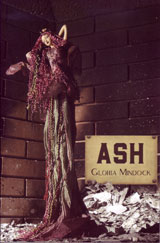 Ash by Gloria Mindock
Ash by Gloria Mindock
Glass Lyre Press, 2021-
Gloria Mindock is the author of I Wish Francisco Franco Would Love Me (Nixes Mate Books), Whiteness of Bone (Glass Lyre Press), La Portile Raiului (Ars Longa Press, Romania) translated into the Romanian by Flavia Cosma, Nothing Divine Here, (U Šoku Štampa), and Blood Soaked Dresses (Ibbetson). Widely published in the USA and abroad, her poetry has been translated and published into the Romanian, Croatian, Serbian, Montenegrin, Spanish, Estonian, Albanian, bulgarian, Turkish, and French. Gloria has been published in numerous literary journals including Gargoyle, Web Del Sol, spoKe, Constellations: A Journal of Poetry and Fiction, Ibbetson, The Rye Whiskey Review, Muddy River Poetry Review, Unlikely Stories, Pratik: A Magazine of Contemporary Writing and Nixes Mate Review and anthology. Gloria has been awarded the Ibbetson Street Press Lifetime Achievement Award and was the recipient of the Allen Ginsberg Award for Community Service by the Newton Writing and Publishing Center. She received the fifth and fortieth Moon Prize from Writing in a Woman's Voice. Gloria was the Poet Laureate in Somerville, MA in 2017 & 2018.
In Gloria Mindock's powerful new book, the flames of love die out and the ashes linger until they dissolve into air. The body is hostage, in charred relics of failed intimacies—The burnt-out ends of smoky days (T.S. Eliot). There's beauty in the truth of Mindock's words and images: Things got smokier, battling the embers with//false waters. And there's hope: Not everyone believes in destruction.// All the heart wants is to beat. Above all, these poems radiate feeling, compassionately aware, attuned to a world of broken love that is burned beyond recognition, the ashes drifting and settling: how much sorrow can this heart take?// There is never an answer. Ash sears and sings.
—Dzvinia Orlowsky, author of Bad HarvestIn Ash, Gloria Mindock writes a gritty, beautifully haunting collection of poetry. Ash is what remains behind after destruction, ruin, death, and burning. Similarly, the poems in this collection are what will remain. Fight the shadows and wade through the darkness on a path paved by Mindock's vivid imagery, stark language, and dynamic voice, all of which, make for a most memorable experience. Now more than ever, we need these poems. With the utmost economy of words, skillful syntax, and emotional connections, each poem reverberates into the depths of your consciousness. Dark, intense, and wholly unique, Ash, by Gloria Mindock is what you've been waiting for—a collection of poetry that consumes and smolders. Are you ready?
—Renuka Raghavan, author of Out of the Blue and The Face I DesireGloria Mindock is a poet with singular vision: in Ash, a human heart is rolled out, then baked, then thrown to the birds; broken crucifixes are shoved into junk drawers and gather dust; a spurned/murdered woman turns into a beautiful plant that gives her ex-lover a rash. With mordant, Pinter-esque wit, Mindock explores just how far love, and even human decency, can unravel—to the point of arson, to the point of war.
Ash begin with a series of poems about lethal house fires that may be literal or metaphorical ("my skin was burned by your compulsion to be famous"), then expands to pinpoint the similar essence of human cruelty that enables soldiers to kill. As the narrator of "Doomed by the Numbers" explains: "the fact is people will still go on brutally/killing each other./Who will take my place and write about it?"
Ash concludes with an engaging, Rabelaisian roundelay of voices—mini-plays, summed up in just two stanzas, about complicated relationships between two people.
Once again, with Ash, Mindock proves herself to be unafraid of the dark. She is truly a leading, contemporary master of the edgy.
—Karen Friedland, author of Places That Are Gone and Tales from the Teacup PalacePassionate and observant, Gloria Mindock is a tragic poet. Her books are wounds revisited. She knows that nothing, never heals.
"With a rolling pin in my hand, I roll your heart out flat... stop it from beating. The redness of blood turns to wax, sticky while wet." (Baked)
She senses the pain of the world in her being.
"The void looms deep, scorched like the desert blowing aimlessly." (Exit)
As her latest book Ash attests without doubt, Gloria is both a warrior and a martyr. Her words are swords that slowly transform into tears.
Her anger at life's injustice is mighty, but mighty is her generosity and her openness towards repair, harmony and universal peace. A must-read Ash conducts the reader through thorny labyrinths of pain and despair, allowing now and then a glimpse of ultimate resolve and liberation in verses of a rare beauty:
"...but gravity is about to free me into space... People will look at me day and night and ask, "what is it?" There is no control over what happens. The cathedral is high and my freckles fell on the floor as I left. Paleness now, that no one sees, but in the universe, I will be a prism." (Gravity)
"...A hunger surrounds us, dust gathers, and is wiped off, space evading all this as songs of the wind come through the window and we all hum." (Room)
$16.00 | ISBN: 978-1-941783-75-7 | 71 Pages
—Flavia Cosma, author of In the Arms of the Father, Val-David, QC
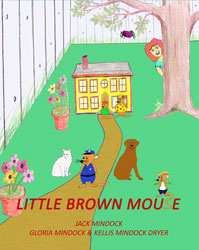 Little Brown Mouse (Children)
Little Brown Mouse (Children)
by Jack Mindock, Gloria Mindock, and Kellis Mindock Dryer
Illustrations by William J. Kelle
Červená Barva Press, 2020-
ABOUT THE AUTHORS
Jack Mindock (b. 1926), author of Little Brown Mouse, spent sixty years of his life as an educator. He was a junior high language arts teacher and K-12 principal in Illinois. He is a World War II Navy veteran and historian who frequently has speaking engagements about his knowledge and experiences. He started telling Little Brown Mouse stories to his children when they were young. They were oral stories, made up as he went along. It was Jack's desire to have some new Little Brown Mouse adventures in print and published for future generations of children to enjoy.Kellis Mindock Dryer, daughter of author Jack Mindock, is a pianist and piano teacher in Cary, NC. She enjoyed composing the two Little Brown Mouse songs in the book. They can be sung with or without the piano accompaniment. If the children and parents reading this book cannot read music, they are welcome to recite the lyrics as poetry or make up their own melodies.
Gloria Mindock is the author of five books of poetry, most recently, I wish Francisco Franco Would Love Me (Nixes Mate books, 2018). She is the founding editor of Cervena Barva Press and one of the USA editors for Levure Litteraire (France). Widely published in the USA and abroad, her poetry has been translated and published into eight languages. Gloria has been awarded the Ibbetson Street Press Lifetime Achievement Award and was the recipient of the Allen Ginsberg Award for Community Service by the Newton Writing and Publishing Center. She also has been awarded the fifth and fortieth Moon Prize by Writing in a Woman's Voice. She was the Poet Laureate in Somerville, MA in 2017 & 2018.
NOTE
When I was three, four, and five years old, my Dad, "Daddy Jack," would make up bedtime stories every night about the adventures of “Little Brown Mouse.” He would leave me in suspense nightly. I couldn’t wait to hear what happened next to Little Brown Mouse. Why Little Brown Mouse? Because Little Brown Mouse did come to my house! This book, Little Brown Mouse, was written for mothers, fathers, and others to read to young children at bedtime.
-Gloria MindockPREFACE
$13.95 | ISBN: 978-1-950063-35-2 | 28 Pages
Welcome to the land of curiosity and adventure! Little Brown Mouse is a bedtime story to make you think, be curious, and ask questions. Here are a few questions to get you started: Have you ever seen a mouse? What color are mice? What do they eat? Where do they live?
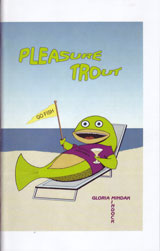 Pleasure Trout by Gloria Mindock
Pleasure Trout by Gloria Mindock
Muddy River Books, 2013-
Gloria Mindock is founding editor of Cervena Barva Press, editor of the Istanbul Literary Review based in Istanbul, Turkey, and one of the USA editors for Levure Littéraire in France. She is the author of La Portile Raiului (Ars Longa Press, 2010, Romania) translated into the Romanian by Flavia Cosma, Nothing Divine Here (U Šoku Štampa, 2010, Montenegro), and Blood Soaked Dresses (Ibbetson, 2007). Gloria's poetry has been translated and published into the Romanian, Serbian, Spanish, and French.
Widely published, her work has appeared in Murmur of Voices, Vatra Veche, UNU: Revista de Cultura, and Citadela in Romania. Other literary journal publications include: Arabesques, Poesia, Phoebe, Poet Lore, Blackbox, River Styx, Bogg, Ibbetson St., WHLR, Web Del Sol, Lost in Thought, and in the anthology Hildagards Daughters (Belgium). Her flash fiction has recently been published in Thrice and Thunderclap. She has work forthcoming in Bliss.
Gloria has had nominations for the Pushcart Prize, St. Butolph Award and was awarded a fellowship from the Somerville Arts Council. She was co-founder of Theatre S & S. Press, Inc. and was one of the founding editors of the Boston Literary Review/BLuR from 1984-1994. Theatre S. received grants from the Polaroid Foundation, The Rockefeller Foundation, The Globe Foundation, NEFA, Massachusetts Cultural Council, and the Somerville Arts Council.
Gloria works as a social worker and freelances teaching workshops. She facilitates events in her Cervena Barva Press studio, located in the Center for the Arts at the Armory in Somerville, MA.
NOTE FROM THE AUTHOR
The poems in this chapbook are all mistranslations taken from poems in languages unknown to me. Sometimes a foreign word would remind me of a word in English. I wrote what I thought the poems were saying knowing that I was wrong in my interpretation. The whole purpose was to write as quickly as I could while looking at the foreign language. I mostly used poems written in Romanian, Serbian, Italian, Spanish and Polish. This is one of my favorite ways to write. This is a work of fiction. Don't try to understand what is written here. Just enjoy the nonsense.
$7.00 | 42 Pages | In Stock
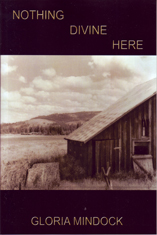 Nothing Divine Here by Gloria Mindock
Nothing Divine Here by Gloria Mindock
U ŠOKU ŠTAMPA PRESS, 2010-
Gloria Mindock is the author of the forthcoming book, La Porile Raiului (Ars Longa Press, 2010, Romania) and Blood Soaked Dresses (Ibbetson Street Press, 2007). She is editor of Cervena Barva Press and the Istanbul Literature Review, an online journal based in Istanbul, Turkey. She has had numerous publications including Poet Lore, River Styx, Phoebe, Blackbox, Poesia, Bogg, Ibbetson, WHLR, UNU: Revista de Cultura, Citadela, Aurora, and Arabesques. She has been nominated for a Pushcart Prize, St. Botolph Award, and was awarded a fellowship from the Massachusetts Cultural Council distributed by the Somerville Arts Council.
From the Preface
Passionate and rebellious, Gloria Mindock’s poetry jumps forcefully from the page, grabs the reader by the collar of his coat and holds and hangs on to his/her attention.
In unison with the poet’s heart, the nature of things is in big turmoil here, forever searching for the elusive Divine Harmony, the only force capable of rearranging the world into one of love and understanding.
In a perpetual state of sadness and grief, these poems descend to the very core of the raw discourse of the soul, devoid of artifice and pose. The stark simplicity of their statement disarms us and leaves us vulnerable in front of the bitter reality of life.
—Flavia Cosma, author of seventeen books of poetry, a novel, a travel memoir, and four books for childrenThe stunning thing about Mindock’s work is its overwhelming sense of the real world in real time. It’s “poetic” in its own way, well-crafted, agile, nicely balanced, but in terms of content, you move into Mindock’s world and you’re suddenly in a basic, essential reality that hardly anyone in the poetry world touches: “I see your skull veiled by a cloud/Eyelids sunk/Hands pressed on knees/Heart gone/A sight of secrets//I think living is brave/Death is a release/The dog knows -- heaven is nothing but a frill.” (“Dog Dance,” p.41). An interesting mixture of existential toughness crowned by an ultimate sense of final nothingness.
It’s interesting how Mindock’s world-view combines a dispairing sense of expanding out into the horrific Now with a vision of everything eventually dissolving into nothingness: “Living on this earth is/one big nightmare.,/This landscape frightens me./Too much death./Think about it.//I refuse to fall short of detail so/ here it is: Death of emotion/Death of love/Death of skin...//I’m going away to where I really belong./To me, this is uplifting.” (“Aftermath,” p.63).
Very few style-games here. This is poetry as a minimalist Declaration of Finality. And the very fact that Mindock doesn’t play style-games makes her vision a thousand times more effective/powerful than the word-game players who turn poetry into a kind of syntactical basketball.
—Hugh FoxIn Nothing Divine Here, Mindock invokes a resurrection, the power of love to spring eternal from the hurt we all know. She looks at the personal and the political, that haunting polarity, and weaves a gentle but brave hopefulness between them.
—Afaa Michael Weaver, Simmons CollegeGloria Mindock is a fearless poet. She gets right in the face, in the very nostril of death. She confronts her past lovers, her dreams, dashed or otherwise, not with cool detachment, but with a visceral lyrical and emotional engagement. She has made her pain into high art, into the high holy. Mindock, is a force to be reckoned with, so watch your back!
—Doug Holder, Arts Editor The Somerville News, Founder Ibbetson Street Press
Review by Michael Parker at Unlikely Stories: http://www.unlikelystories.org/blog/
$15.00 | ISBN: 978-0-578-04760-7 | 87 Pages | In Stock
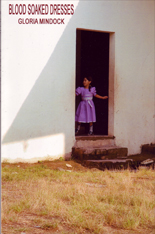 Blood Soaked Dresses by Gloria Mindock
Blood Soaked Dresses by Gloria Mindock
Ibbettson Street Press, 2007-
In her fascinating poem cycle, Gloria Mindock jolts back into memory the roots of El Salvador's present day violence. Mindock coaxes to the page the voices of the dead who lie, less in peace, than in restless obsession with the atrocities they suffered. She brings forth as well the voices of the living who seem startled to find that they died somewhere between the horrors they witnessed and the grave they have yet to lie down in. Blood Soaked Dresses is a beautiful, harrowing first book.
-Catherine SasanovWe are reminded of Cezar Vallejo's witnesses: bones, solitude, rain, and the roads -- that we are tied to each other in beauty and suffering, life and death. Gloria Mindock's poems grant us the voice of a soul caught on a limb between the promise of peace everlasting and impossible resurrections. Poem after poem we are asked to uncover those whose bitter ash weeps over the world, and no other country/wants to see it. This book is written from a compassionate heart that whispers and grieves, one that isn't afraid to holds its gaze.
-Dzvinia OrlowskyA poet must never shy from the necessary, no matter how hard it is. In poetry that is both elegant and brutal, Gloria Mindock exposes the horror of the Salvadorian conflict especially on women. Though Salvador has faded from the front pages, the war has reincarnated in other countries on other continents making "Blood Soaked Dresses" completely contemporaneous. This poetry possesses, as Yeats said, "a terrible beauty." And we need it now more than ever.
-John MinczeskiThe reader of Blood Soaked Dresses is enriched by Mindock's power and commitment. She has earned a place among our great protest poets, reminding us, with lyric tension, that social justice is our constant and necessary concern.
$13.50 | ISBN: 978-1-4303-1034-1 | 72 Pages
-Simon PerchikOrder at Lulu.com: http://www.lulu.com/content/1172519
"El Salvador, 1983" was translated into Serbian by Berislav Blagojevic:
http://hiperboreja.blogspot.com/2011/05/el-salvador-1983-glorija-mindok.htmlBerislav Blagojevic's Blog:
http://berislavblagojevic.wordpress.com/2011/05/17/el-salvador-1983/To read reviews go to:
Boston Globe review by Ellen Steinbaum:
http://www.boston.com/news/local/articles/2007/12/09/Boston Area Small Press and Poetry Scene Reviews:
http://dougholder.blogspot.com/search?q=lo+gallucio
http://dougholder.blogspot.com/search?q=irene+koronas
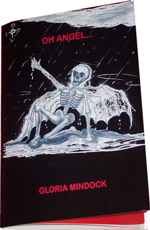 Oh Angel by Gloria Mindock
Oh Angel by Gloria Mindock
U ŠOKU ŠTAMPA-2005-
If you don't believe in angels, this compelling collection of poems about them might give you pause for thought. Among the kinds of angels Gloria Mindock addresses are male and female, guardian, loyal, and fallen angels, even a vacationing angel. As in the title poem, which opens the book, she often exclaims, "Oh angel," in conjecture, disappointment, pique, passion, or some other emotion. Angels dominate her consciousness, her moods, her actions. For instance, "Wild" begins, "Oh angel, at dawn, / I get up and sit in the nicest room," and in "Guardian Angel Sits on Left" she says, "The angel is curled against / me . . . / She protects me." But by the end of the poem, "The angel went on to / guard another." Though desirable, angels can sometimes be disloyal, like people. In "Wings" the speaker chides a traitor angel and then reproaches a lover who has deserted her: "Oh Herman-stupid man / Prodigies won't help / Poetry is necessary / just like me." This passage recalls Wallace Stevens' "necessary angel," his name for the imagination, whose necessary product is poetry. Stupid Herman "jumped out too soon," leaving the speaker at first bereft but then with a new subject for a poem, a new sense of worth. Oh Gloria, what else are lovers and angels for?
-George HeldTo read a review of Oh Angel visit: http://dougholder.blogspot.com/2006_02_12_dougholder_archive.html
$5.50 | 16 Pages | Out of Print
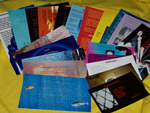 Postcard Series: One Designed by Gloria Mindock
Postcard Series: One Designed by Gloria Mindock
Červená Barva Press-2005- $15.00 | 21 Postcards | In Stock: 10
Nancy Mitchell
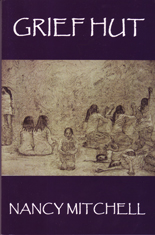 Grief Hut by Nancy Mitchell
Grief Hut by Nancy Mitchell
Červená Barva Press, 2009-
Nancy Mitchell is the author of The Near Surround (Four Way Books, 2002) and her poems have appeared in Agni, Poetry Daily, Salt Hill Journal, Great River Review, and are anthologized in Last Call by Sarabande Books. She has received an Artist in the Schools grant for Virginia, and residency fellowships from the Virginia Center for the Creative Arts in Amherst, Virginia and in Auvillar, France. Mitchell teaches in the English Department at Salisbury University, Maryland, and has taught in the Stonecoast MFA program in Maine. She resides in Salisbury, on the Eastern Shore of Maryland, with her husband John Ebert, a filmmaker.
The Grief Hut stands on an imaginary beach, where women help each other to give birth to their griefs: the birth of sorrows here is given words with a growing power, intensity, and wisdom, a wisdom still wired to its human love and memory.
-Jean ValentineMitchell is blessed with a vivid--and haunting--memory--of particulars, the things of our past, and of the more complex feelings the things generate. She refuses nothing, she is deadly accurate, yet she sings. We should read her.
-Gerald SternThe poems in Nancy Mitchell's book Grief Hut are so lucidly and deeply felt that they cut directly to the bone of the experiences they are recounting. This is a true and an incredibly beautiful book.
-Malena MörlingHer descriptions of people, the details and detritus of their lives are studied and stunning. May we hear more from this talented poet.
-Doug Holder/Ibbetson Street PressReview of Grief Hut:
$15.00 | ISBN: 978-0-615-25797-6 | 66 Pages | In Stock
http://coloradoreview.colostate.edu/cr/bookreviews/griefhut.html
Barbara Molloy
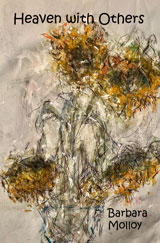 Heaven with Others by Barbara Molloy
Heaven with Others by Barbara Molloy
Červená Barva Press, 2023-
Barbara Molloy is a writer, artist, and jazz vocalist who makes her home in Coupeville, Washington on beautiful Whidbey Island. A previous book of poems, In Favor of Lightning, was published by Wesleyan University Press. Ms. Molloy's work has been nominated for Pushcart prizes and has won awards from The Pen Foundation. Her poems have appeared in a variety of literary journals.
Barbara Molloy's new collection Heaven with Others is a feast for the senses, as well as an elegiac reminder that all we have is the present. These poems study mortality: "As if it was not her at all,/dying,/abut to die,/being dead,/or returned to life..." (“Gift of Sunflowers”). In the hands of this accomplished lyricist even the most sordid past is rendered as fine art and gifted with visceral re-birth in organic images not easily forgotten: "Leaves strewn about the yards-/the exact color of church and rectory bricks..." (Breeze). Molloy's voice brings down the high-brow and lifts up the colloquial. We are the beneficiaries of her vision.
-Judith SkillmanIn this new collection, Barbara Molloy Olund keeps a sharp focus on the chaos of discarded objects and lives while tracking surprising moments of humor. "Who said 'cherish the moments' and/ 'life gives you a lemon; make lemonade?'/ Are they tired yet?..." asks the narrator (Of Ghosts). These poems respect the hard work of living. There's an intention here, almost a promise, to never let go of what matters, no matter how seemingly unimportant an object or detail, how elusive a relationship-what prevails is the intention to continue searching for what's real and what's not. "I will not love the past./ Let it glitter. Let it sit forward..." (Decision). I admire how this work confronts the spiritual labor of care giving, birthing, struggling with addiction, negotiating with ghosts, and parenting. And I'm touched by the ongoing, archetypal process running through these pages-the sorting-out of wisps of beauty from the detritus of life.
-Christianne Balk"Sometimes," Barbara Molloy writes "the most impossible/variables line up." And in her poems, they do. Her poems leave me breathless, off kilter, bewildered (in the archaic sense of being lured into the wilds). In these wilds, grief is a force of gravity. The vision here is uncanny-the familiar is strange, the strange familiar. The seemingly ordinary embodies the unforeseen, what Stanley Plumly called in her first book "a kind of clairvoyance."
-Eric PankeyThe poems in Barbara Molloy's new book, Heaven With Others, don't rest quietly in the realm of the familiar and quotidian. Nor do they keep to the territory of the uncanny and mysterious. Molloy's poems travel in the shifting borderlands between those irreconcilable worlds. That's the rocky, unmapped terrain that her fiercely moving poems lead us through. I'm reminded of Jean Valentine's sudden leaps into unforeseen light, and also of C.K. Williams's earthbound acknowledgement of the grit underfoot. These beautiful, memorable poems are compassionate, honest testaments to what it is to walk here alone and in company, as a mortal body inhabited by spirit and dream.
$18.00 | ISBN: 978-1-950063-54-3 | 56 Pages
-Jennifer Atkinson
Edward Morin
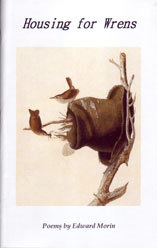 Housing for Wrens Poems by Edward Morin
Housing for Wrens Poems by Edward Morin
Červená Barva Press, 2016-
Edward Morin was born in Chicago and, while growing up, spent summers in the Upper Peninsula of Michigan. He has graduate degrees in English from The University of Chicago and Loyola University (Chicago) and has taught at seven Midwestern colleges and universities, including The University of Cincinnati, Wayne State University, and The University of Michigan.
His previous titles include Labor Day at Walden Pond (poems), The Dust of Our City (poems), and Transportation: Hot Tunes and Blues from Motor City (recorded songs). He is editor and co-translator of an anthology, The Red Azalea: Chinese Poetry since the Cultural Revolution (University of Hawaii Press). He has co-edited the anthology, Before There Is Nowhere to Stand: Palestine/Israel: Poets Respond to the Struggle (Lost Horse Press, 2012).
He has won prizes in nine national poetry contests and has had poems in Hudson Review, Prairie Schooner, River Styx, Poetry Northwest and many other magazines. His co-translations of Chinese, Arabic, and Greek poetry have appeared in Iowa Review, New Letters, Hayden's Ferry Review, and Banipal: Magazine of Modern Arab Literature. His articles and reviews have been published in The Georgia Review, Michigan Quarterly Review, and The Detroit News.
The author has worked as a writer for a few corporations. He has acted and sung in productions of several regional theatre and opera companies. He co-hosts The Crazy Wisdom Poetry Series in Ann Arbor, Michigan, and is editor of Peninsula Poets, the journal of the Poetry Society of Michigan. He lives with his wife in Ann Arbor.
Edward Morin has assembled lyrics and narratives touching on subjects you and I like to read about. The exquisite title poem prepares us for engagements with blue jays, bank swallows, wood thrushes—and also the pleasures of singing, fishing, even of aging. The language is to be savored and the hard-won wisdom taken to heart.
-Laurence Goldstein, author of Poetry Los Angeles: Reading the Essential Poems of the CityThe poet uses eyes, "the most spiritual of the senses," and ears—"this recluse trills its two voice boxes / like Pan's double flute"—to present reflective narratives of the world in and around us, in backyards, at workplaces. Witnessing compulsions and hardships of contemporary life, Morin evinces winged sensibilities and deep-rooted compassion. His praise of a fellow poet ("Poetry Man") could apply to his own poems' "fire smoldering in the belly" rising "to enchant the heart and brain."
-Lyn Coffin, poet, playwright, fiction writer, and translatorSome of my favorite contemporary poems are in earlier books by Ed Morin, and this fresh chapbook offers several more, especially the family and love poems, poems of conscience and responses to the violence of needless war and domestic crimes. The poems have remarkable range in portraying a holdup, which almost cost his life, and his avocation as an actor and professor. This collection is a distinguished addition to the Cervena Barva Series. I hope it inspires a longer Collected Poems, for this poet deserves honors and attention.
$7.00 | ISBN: 978-0-9966894-7-2 | 44 Pages | In Stock
-David Ray, author of 20 books including Music of Time: New and Selected Poems
Susanne Morning
-
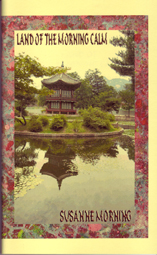 Land of the Morning Calm
Land of the Morning Calm
by Susanne Morning
Červená Barva Press, 2007 -
South Korea, referred to as the hermit kingdom of Asia, has been the home of New Zealand author/painter Susanne Morning for the last 7 years. Fascinating and humorous, Land of the Morning Calm unearths the bizarre and unexpected elements of this ancient/modern Confucian culture. An archeological dig that will put dirt under your nails and priceless relics in your hands!
$7.00 | 29 Pages | In Stock
E.K. Mortenson
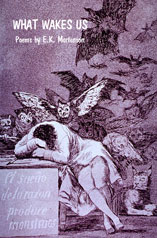 What Wakes Us Poems by E.K. Mortenson
What Wakes Us Poems by E.K. Mortenson
Červená Barva Press, 2014-
E. K. Mortenson is the author of the chapbooks, The Fifteenth Station (Accents Publishing, 2012) and Dreamer or the Dream (Last Automat Press, 2010. His work also appears in both print and online journals as well as anthologies. He was the 2008 recipient of the Leslie Leeds Poetry Prize, the 2012 Accents Publishing Chapbook Award, and is an instructor in the MFA in Creative and Professional Writing program at Western Connecticut State University. He writes and teaches in Pennsylvania where he lives with his wife and two children.
Answer: Attention, which is a kind of compassion.
[Somewhere between Charles Wright's obsession with the shadows where the physical and the spiritual worlds meet and David Kirby’s laughably brilliant ability to find the gut-rooted humor in both worlds, we find E. K. Mortenson's poems of celebration and grief, of laughter and agony, of people in dreams and people in our arms, all recycling: the hands of a lost grandfather come again in the hands of a toddler fascinated with water; the world refashions itself as another day, every day; what's out there is born again in the brain, and that loop makes a mind and something at least like a soul.]
Q: What is the central energy in the universe?
—Brian Clements, author of And How To End It and Jargon
E. K. Mortenson's What Wakes Us is a delightful exploration of the world at hand. The poems experiment with lineation – seeing what's possible both with the fractured line of Ferlinghetti's early poems, and with a more sustained line reminiscent of C.K. Williams. The final section of the book abandons the device of lineation altogether in a sequence of prose poems. But throughout the book, there are pleasures to be found. There is the startling comparison of eyes "the blue / of the continental shelf / on a pull-out map / from one of his National Geographics / with which I would wallpaper my room." There is the worry of a father holding a sick child, who is "terrified to wake you, / to spill the overfull cup of your sleep." And there is the accuracy of moments like this: "Small boats creak in the harbor, with only a token strain at their mooring lines, dangling kelp and dulse and carrageen." The reader of Mortenson's work will find many such pleasures.
$17.00 | ISBN: 978-0-9910091-3-8 | 72 Pages | In Stock
—Charles Rafferty, author of Appetites and A Less Fabulous Infinity
Alexander Motyl
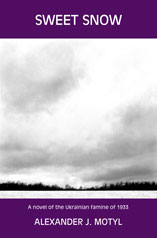 Sweet Snow A novel of the Ukrainian famine of 1933
Sweet Snow A novel of the Ukrainian famine of 1933
by Alexander J. Motyl
Červená Barva Press, 2013-
Cover Photograph: Mark Hewko
Alexander Motyl is a writer, painter, and professor. He is the author of four novels, Whiskey Priest, Who Killed Andrei Warhol, The Jew Who Was Ukrainian, and Sweet Snow, and two novellas, Flippancy and My Orchidia; his poems have appeared in Mayday, Counterexample Poetics, Istanbul Literary Review, Orion Headless, The Battered Suitcase, Red River Review, Green Door, and New York Quarterly. He has done performances of his fiction and poetry at the Cornelia Street Café and the Bowery Poetry Club in New York. Motyl’s artwork is represented on the Internet gallery, www.artsicle.com, and has been exhibited in solo and group shows in New York, Philadelphia, Westport, and Toronto. He teaches at Rutgers University-Newark and lives in New York.
Sweet Snow is set in the winter of 1933 in Ukraine. A terrible famine is raging in the countryside, while the Soviet secret police is arresting suspected spies in the cities. A German nobleman from Berlin, a Jewish communist from New York, a Polish diplomat from Lwów, and a Ukrainian nationalist from Vienna come to share a cell in some unknown prison. One day, as they are being transported to another prison, their van overturns, their guards are killed, and they are freed — to wander amidst the devastated villages, desolate landscapes, snowbound villages, and frozen corpses. As they struggle to survive, they come to grips with the horror of the famine as well as with their own delusions, weaknesses, and mortality.
$18.00 | ISBN: 978-0-9883713-7-8 | 154 Pages | In Stock
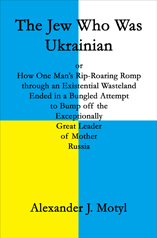 The Jew Who Was Ukrainian or
The Jew Who Was Ukrainian or
How One Man’s Rip-Roaring Romp through an Existential Wasteland Ended in a Bungled Attempt to Bump off the Exceptionally Great Leader of Mother Russia
by Alexander J. Motyl
Červená Barva Press, 2011-
Alexander J. Motyl (b. 1953, New York) is a writer, painter, and professor. He is the author of four novels, Whiskey Priest, Who Killed Andrei Warhol, Flippancy, and The Jew Who Was Ukrainian; his poems have appeared in Counterexample Poetics, Istanbul Literary Review, Orion Headless, The Battered Suitcase, Red River Review, and New York Quarterly. Motyl’s artwork has been exhibited in solo and group shows in New York, Philadelphia, and Toronto. He teaches at Rutgers University-Newark and lives in New York.
The Jew Who Was Ukrainian is a devilishly witty intellectual farce in which historical meditation faces off with madcap lampoons of past and present political rogues and assassins. Motyl’s wildly imaginative riff on a century of East European history is a must read. The Moral of the Popcorn reigns!
—Catharine Theimer Nepomnyashchy
Ann Whitney Olin Professor of Russian Literature, Barnard CollegeOnly Alexander Motyl could conjure up this delightful mixture of ghoulish, existential madcappery with insightful, satirical brilliance. This is a fantasy for the adventuresome, geopolitical reader who’s eager to have his mind bent and tickled.
—Jed Feuer
Composer, New York CityThis hilarious and poignant anti-historical novel is a vertiginous journey through the Russian Revolution, Stalin’s purges, Nazi concentration camps, underground anarchist gatherings, and the KGB network. A great master of tragicomedy, Alexander Motyl shows with eminent irony that twentieth-century history was funnier than Joyce imagined and much more horrible than Orwell prefigured. His main character, the laughable Volodymyr Frauenzimmer, works through his excruciating guilt, split hence irreconcilable identity, and obfuscating desire to settle accounts with history. Pondering the question of whether to kill or not to kill the next Russian dictator, Volodymyr transcends the border of the real and enters a realm where infamous political terrorists and their famous victims come together to discuss the self-destructive power of hatred. This book is a cold shower for anybody who still thinks you can change history and passionate encouragement for all those confident that you can do nothing about it.
—Yohanan Petrovsky-Shtern
Associate Professor in Jewish History, Northwestern UniversityCandide meets The Terminator—in the funhouse of history, ethnic prejudice, ethics… and the dysfunctional family. An intellectual thriller (camps and assassins included).
—George G. Grabowicz
Professor of Ukrainian Literature, Harvard UniversityAlexander Motyl is a master of seduction by the preposterous.
—Myrna Kostash
Writer, Edmonton, Canada
Reviews
July 18, 2011:
Review by Michael Johnson in The American Spectator
http://spectator.org/archives/2011/07/18/a-romp-through-history/
June 2, 2011:
The new Pathway Ukrainian Weekly
http://www.infoukes.com/newpathway/22-2011-Page-7-1.html
May 24, 2011, Ukrainaian Candian TV
Interview with Alexander J. Motyl in Ukrainain:
http://www.youtube.com/kontaktukrainianTV/#p/u/15/UrKYpUe1WPs
April 27, 2011
Review in the Kyiv Post:The Jew Who Was Ukrainian is a blackly comedic, anti-historical, and absurdist novel about a tortured Jewish-Ukrainian man who struggles vainly to find meaning at the intersection of Hitler’s Holocaust and Stalin’s Gulag. The hero of this preposterous story is Volodymyr Frauenzimmer, a man with a preposterous name and a preposterous past. His Ukrainian mother was a Nazi concentration camp guard and hates Jews. His Jewish father was a Stalinist butcher and hates Ukrainians. Poor Volodymyr doesn’t know how to cope with his dreadful past until he discovers the redeeming power of hatred and resolves to kill the Exceptionally Great Leader of Mother Russia—the fish-eyed Pitoon, a half-Russian, half-German dictator whose name happens to...
Read more: http://www.kyivpost.com/news/opinion/op_ed/detail/102945/
Temporarily Out of Stock
$16.00 | ISBN: 978-0-9831041-1-7 | 181 Pages | In Stock
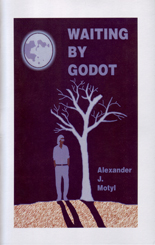 Waiting By Godot by Alexander Motyl
Waiting By Godot by Alexander Motyl
Červená Barva Press, 2009-
Alexander Motyl is a writer, painter, and professor. His novels include Whiskey Priest, Who Killed Andrei Warhol, and Flippancy. His art is represented by The Tori Collection. Motyl teaches at Rutgers University-Newark and lives in New York City.
His web site is: www.AlexanderMotyl.webs.com.
$1.00 | 5 Pages | In Stock
Barbara E. Murphy
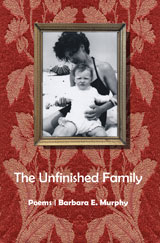 The Unfinished Family Poems Barbara E. Murphy
The Unfinished Family Poems Barbara E. Murphy
Červená Barva Press, 2024-
Barbara E. Murphy's poetry has appeared or is forthcoming in journals including Green Mountains Review, Threepenny Review, Barrow Street, and New England Review. She is a recipient of a Vermont Arts Council Fellowship and twice-nominated for a Pushcart Prize. Murphy served as a faculty member at the New England Young Writers Conference and is a board member of Sundog Poetry. A collection of her poems, Almost Too Much was published by ČervenÁ Barva Press in 2015. Her essays and reviews have been published in several venues including The New York Times, Plume Poetry, Full Grown People, and Green Mountains Review. She lives and writes in Burlington Vermont.
Description:
Barbara E. Murphy's compelling The Unfinished Family comes to terms with the notion that families can ever be "finished.' The poems in this brave and provocative collection explore the impulses of duty and loyalty, love and fear and compulsion for perfection as the speaker comes to embrace the mistakes that are inevitable in every family. These poems are as honest as they are hopeful in their insistence that we return again and again to the messy work of being with our people and starting again.In The Unfinished Family, Barbara Murphy offers a master class on the compressed narrative and the withheld detail. Whether she turns a discerning, critical eye on her birth-family—a troubled father, a mother born into "the wrong era, wrong marriage, wrong life"—or her own made family she brings a wealth of memorable phrases, smart insights, and emotional yearning as well as an empathetic eye and forgiving mind that "lets a little light in too."
—Neil Shepard, author of The Book of FailuresPart of our human beauty is that we live in a state of being unfinished. This is why memory is so powerful. Barbara Murphy's exquisite, beautiful poems are a series of finely etched portraits that enact how our moments accumulate into meaning as they move toward another world we will never know yet help create. Muscular, lyric language and an agile form makes these powerful poems tap us on the shoulder and awaken us from our delirium and into the transcendent. Murphy's poems show us how personal history and time intersect leaving behind a memory that never vanishes. These poems claim life and life claims these poems. This book is a treasure.
—Elizabeth A.I. Powell, author of AtomizerBarbara Murphy's The Unfinished Family is haunted by the archetypal ghost of a perfect family against which the speaker holds memories—brilliantly precise and unequivocally rendered—and finds them wanting. Yet, the honesty, bravery and fidelity with which she acknowledges her disappointments burnish these poems with love, humor and pathos. We should read her.
—Nancy Mitchell, author of The Out of Body ShopPhoto: Karen Pike
$18.00 | ISBN: 978-1-950063-92-5 | 58 Pages
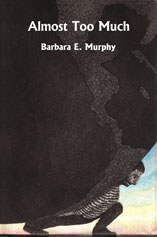 Almost Too Much by Barbara E. Murphy
Almost Too Much by Barbara E. Murphy
Červená Barva Press, 2015-
Barbara Murphy’s work has appeared in several literary journals including New England Review, Green Mountains Review, The Threepenny Review, and Michigan Quarterly Review. She was nominated for a Pushcart Prize and is the recipient of a Vermont Council on the Arts fellowship. Murphy has worked as president of Johnson State College in Vermont since 2001 and has been recognized for her leadership roles in higher education. She lives and works in northern Vermont with her husband Tom Garrett.
Almost Too Much both tactfully and relentlessly interrogates our human experience in these dehumanizing times. There’s not a sliver of false hope in these pages, but reading them, we catch glimpses of the paradox of our lives, that "The sound of geese /overhead, their thin cries clear /as night through the ceilings and roof / of the house, is either the saddest /sound [we] will ever know / or one of great lifting joy." Barbara Murphy’s quietly brilliant poems move us readers toward usable truth.
—David Huddle Author of Glory River and Blacksnake at the Family ReunionMurphy’s lyrical narratives, lively and exact, speak of braveries and hesitations, fugitive beauties and stations of calm. A lifetime of truths take the reader through first games of hide and seek, the boys so far away/lost in their secret places/there was no way/they’d ever get home in time; first loves and second marriages where desire is more of a casual friend./It will not/always be there breathless and flushed; loving children and step-children with different needs in different time zones. These poems should be read aloud for their honesty and musicality. They do the heart good. Almost Too Much is a stunning debut.
—Dzvinia Orlowsky Author of Silvertone and A Handful of BeesDeeply intimate, each line a breath. In flashes of brilliance against a landscape of existential dread, these poems flare up and stare down this given world until it surrenders its grace.
—Nancy Mitchell Author of The Near Surround and Grief Hut
Reviews:
$17.00 | ISBN: 978-0-9861111-3-6 | 70 Pages | In Stock
http://www.basementmedicine.org/arts-entertainment/2015/05/07/5553/
Home | Červená Barva Press Books | Poetry Chapbooks | Poetry Books | Anthologies | Fiction | Flash Fiction | Literary Journals | Non-fiction | Plays | Memoirs | Used Books | Audio CD's
